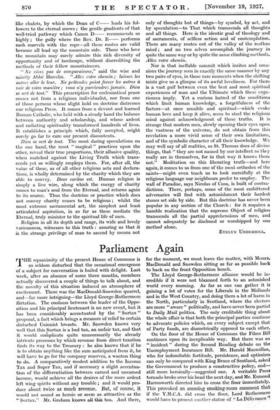Parliament Again
THE equanimity of the present House of Commons is so seldom disturbed that the occasional emergence of a subject for conversation is hailed with delight. Last week, after an absence of some three months, members actually discovered a couple of things to talk about, and the novelty of this situation induced an atmosphere of excitement. There was the MacDonald-Snowden quarrel, and—far more intriguing—the Lloyd George-Rothermere flirtation. The coolness between the leader of the Oppo- sition and his principal lieutenant is no new event, but it has been considerably accentuated by the " Surtax " proposal, a fact which brings a measure of relief to certain disturbed Unionist breasts. Mr. Snowden knows very well that this Surtax is a bad tax, an unfair tax, and that it would complicate quite unnecessarily the already intricate processes by which revenue from direct taxation finds its way to the Treasury : he also knows that if he is to obtain anything like the .sum anticipated from it, he will have to go for the company reserves, a wanton thing to do. A comparatively modest addition to the Income Tax and Super Tax, and if necessary a slight accentua- tion of the differentiation between earned and unearned income, would achieve all the desires of the more ardent left wing spirits without any trouble ; and it would pro- duce about twice as much revenue. But, of course, it would not sound as heroic or seem as attractive as the "Surtax." Mr. Graham knows all this too. And there,_ for the moment, we must leave the matter, with Messrs. MacDonald and Snowden sitting as far as possible back to back on the front Opposition bench.
The Lloyd George-Rothermere alliance would be in- credible if it were not blazoned forth to an astonished world every morning. As far as one can gather it is gaining a lot of votes for the Liberals in the Midlands and in the West Country, and doing them a lot of harm in the North, particularly in Scotland, where the electors are more " aware " politically, and have never been partial to Daily Mail politics. The only creditable thing about the whole affair is that both the principal parties continue to advocate policies which, on every subject except that of Party funds, are diametrically opposed to each other.
On the floor of the House of Commons the Films Bill continues upon its inexplicable way. But there was an " incident " during the Second Reading debate on the Unemployment Insurance Bill. Mr. Harold Macmillan, who for indomitable fortitude, persistence, and optimism can only be compared with King Bruce of Scotland, asked the Government to produce a constructive policy, and— still more heroically—suggested one. A veritable Press tornado broke over his head the next day, and Mr. Esmond Harmsworth directed him to cross the floor immediately. This provoked an amusing smoking-room comment that if the Y.M.C.A. did cross the floor, Lord Rothermere would have to present another statue of. " LaDOlivrailecl. to the Carltim'Club and get Mr. Lloyd George to unveil it.
Thus there have been disturbances in every camp. Only the Cabinet enjoys untroubled slumber. M:. Baldwin has decided that nothing is to be done if he can help it. The -Times may fulminate about his appoint- ments. Well, let it! He is not going to be plagued with young men full of ideas. Why should he be ? Ten to one the ideas are all wrong. So long as he is there, industry is going to be left to its own devices, and if the country doesn't like that they can get someone else to make a mess of it. That is his philosophy and policy. We shall not know if lie is intrinsically right or wrong for several years to come. And we shall not know if the country thinks lie is right or wrong until 1929. WATCHMAN.















































 Previous page
Previous page